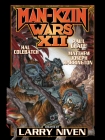Man-Kzin Wars XII by Larry Niven (best books to read ever TXT) 📗

- Author: Larry Niven
Book online «Man-Kzin Wars XII by Larry Niven (best books to read ever TXT) 📗». Author Larry Niven
Later again, in the wait for assignment to combat duty, this slave had nervously presented him with a monkey musical instrument. It was called a "triangle" and this described it well. It was a piece of metal in triangular shape which gave off a musical note when struck.
Trooper Number Eight did not know what a philharmonic orchestra was, or that this slave had once been a musician in the Munchen Philharmonic, but he had kept the triangle and the small mace with which it was struck. He had known it would annoy Sergeant, so had only struck it when he was alone. Striking the triangle and hearing and meditating upon its solitary note was better than thinking about either the past, about the Sire and mother and the home on another world that he knew he would never see again, or about the future.
Eventually a movement order had come. They were going south, they were told, to a rioting jungle where feral humans hid.
It turned out that it was not quite a jungle, but not far off one. They had been added to the garrison of a small post on the edge of a large area of hilly rainforest under a single officer.
Their new assignment—disappointingly unimportant, and without the compensations of servants or amenities and generally inglorious—had increased the ill-temper of the other kzinti, who had expectations of great battles and conquests. There were rumors that the planetary governor was holding back his best troops and weapons for his own purposes. A double-star system with its mineral-rich asteroid belt and what the humans called the Proxima System not far away could add up to a fertile hunting territory in which one of high nobility might nurture ambitions and plans. Earth and its rich belt, as well as other minable planets and the satellites of its gas giants, were but little more than four light-years away—a distance that fell very far short of daunting the heroic race. The governor might plan much.
All this talk had been exciting enough for the Patriarch's army and navy in general but had brought the sidelined kzinti of Trooper Number Eight's unit little prospect of glory. It seemed that the prizes would go to others. Further, the kzin had evolved on a cooler planet than Ka'ashi and this area was hotter even than the Munchen area or the forests and mountains to the north and east. There were none of the diversions of the cities, and though it had been described to them as a combat posting, the kzinti troopers soon saw their role there, rather than a posting to the areas of real fighting, as a plain indication that their superiors did not consider them a first-class unit, an impression which was strengthened by the tired-looking, unimpressive pawful of kzinti they reinforced.
Trooper Number Eight had discovered that his role as the unit's driver-of-slaves seemed to cling about him even though, on active service, there were no slaves to drive. Somehow all had agreed that he should carry on the duties which slaves under his command had carried out previously—he would be responsible for keeping the unit's quarters clean, though at least each trooper cleaned and maintained his own weapons and equipment. He also found that he had become Sergeant's personal servant for certain tasks.
They had learned that the feral humans in the area were actually few in number, and that the campaign on both sides was mainly a matter of small-scale ambushes. To give it a little excitement—some sauce to a tasteless dish—the kzinti tended to use wtsais where possible, rather than their modern weapons. The heat and the low quality of the enemy also gave them motives not to wear the heavy and constricting battle armor. The humans themselves seemed poorly armed with an assortment of projectile weapons and from the parsimonious way they used ammunition it appeared that they were not well supplied with it. Those humans they killed appeared ill fed and in poor health.
The human strategy was, it seemed, to infuriate the kzin garrison by pinprick attacks against patrols or to launch a few bombs and missiles at the kzin base and then disperse. This meant that the kzinti, who could not let the area be turned into a privileged sanctuary for the human resistance forces, had to commit more assets to pacifying the area than it would otherwise have warranted. The heavy vegetation cover and abundance of life-forms with heat signatures meant that satellite surveillance showed little of tactical use. Further, the feral humans in space made a point of destroying kzinti satellites whenever they could, or editing their transmissions so the pictures that they sent were false—they had even caused kzinti to attack their own positions at times.
Nuclear, chemical, biological, oscillation, or a number of other weapons in the kzin armory could have made short work of the forest and everything in it, but the higher command wished to keep the place as a future hunting territory. Whether or not the feral humans knew this, they had kept their activities several rungs below the threshold where such massive retaliation would be warranted and never assembled in large concentrations. So





Comments (0)